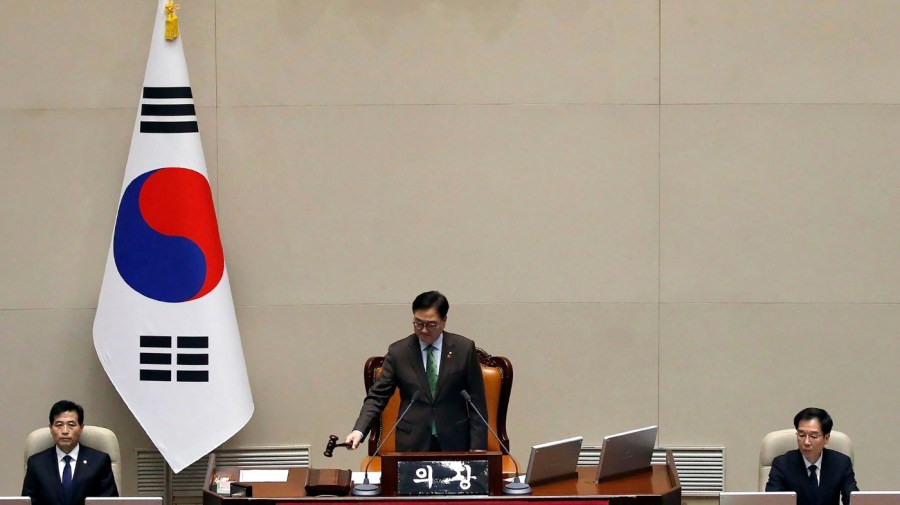
On Saturday, South Korea’s National Assembly, the country’s unicameral legislature, voted to impeach President Yoon Suk Yeol.
His fate will now be decided by the Constitutional Court. If the court votes to remove Yoon — likely, since his Dec. 3 declaration of martial law has been roundly condemned throughout South Korean society — the country will head to the polls to select the 14th president of the Republic of Korea.
In the meantime, domestic turmoil continues. The impeachment is by no means the end of the crisis, as Leif-Eric Easley of Seoul’s Ewha University said. “It is not even the beginning of the end, which will ultimately involve election of a new president,” he said.
Even if Yoon survives the crisis, the episode is undoubtedly the end of his most important, bravest, and most unpopular accomplishment. Yoon was instrumental in building a security partnership with Japan.
The South Korean leader traveled to Camp David in August of last year to meet President Joe Biden and Japanese Prime Minister Fumio Kishida. There, the three leaders issued “The Spirit of Camp David,” a joint statement to “inaugurate a new era of trilateral partnership.”
“This is a moment that requires unity and coordinated action from true partners, and it is a moment we intend to meet, together,” the statement reads. “Japan, the Republic of Korea and the United States are determined to align our collective efforts because we believe our trilateral partnership advances the security and prosperity of all our people, the region and the world.”
The grouping of the three states is now known by the acronym “JAROKUS.”
Biden in the Camp David statement “commended President Yoon and Prime Minister Kishida” for courageously transforming their relationship. But Yoon, far more than Kishida, was the hero of that moment. There is extreme animosity in Korea toward Japan, due to Japan’s annexation of Korea at the beginning of the 20th century and brutal Japanese rule there through the end of the Second World War.
Today, Japan and the U.S. are treaty allies. So are South Korea and the U.S. But Japan and the South are not allies. Both Tokyo and Seoul — and especially Seoul — have often treated each other as adversaries. It has been a long-standing U.S. policy to get the two capitals to work closely, but it was not until Yoon’s presidency that the prospect of sustained progress emerged.
One of the first casualties of Yoon’s political demise, therefore, will be cooperation with Japan and maybe even the U.S.
“If Yoon is no longer president, then Lee Jae-myung, the leader of the leftist Democratic Party of Korea, is likely to become the next president of South Korea,” Tara O of the East Asia Research Center told me. “Lee is pro-Communist Party of China, pro-North Korea, anti-South Korea, anti-U.S. and anti-Japan. He and his supporters constantly stir up anti-Japan sentiment in South Korea.”
Lee is following in the footsteps of Yoon’s immediate predecessor, Moon Jae-in, also of the Democratic Party of Korea, more commonly called “Minjoo.” Moon during his term did everything to sabotage relations with Tokyo, especially defense ties.
For instance, Moon in 2019 announced he was terminating GSOMIA, the General Security of Military Information Agreement with Japan. He ultimately relented, but only just a few hours before the pact was to expire and under intense pressure from, among others, Washington.
Minjoo’s Lee is bound to take up where Moon Jae-in left off.
“The real issue can be seen in the impeachment motion that complained that the president’s ‘Japan-centered’ policy antagonizes North Korea, China and Russia,” David Maxwell of the Washington, D.C.-based Center for Asia Pacific Strategy told me. “This is the problem with the political opposition in South Korea. They view the trilateral [South Korea]-Japan-U.S. cooperation negatively and will likely try to undo it when they come to power, which they are likely to do in the next election.”
“The members of the opposition are under the naïve belief that South Korea can appease North Korea, China and Russia,” Maxwell, who served five tours of duty as a U.S. Army Special Forces officer in Korea, also said.
“They would rather weaken the [South Korea]-U.S. alliance and trilateral cooperation with Japan and the U.S. to send a message that they do not have a hostile policy toward North Korea, China and Russia. The political opposition in the South does not seem to acknowledge that it is North Korea, China and Russia that have hostile policies toward the South.”
Maxwell also says that Pyongyang, Beijing and Moscow might execute those hostile policies more vigorously because of a shift to appeasement in Seoul. In fact, North Korea’s previous leader, Kim Jong Il, responded to South Korean President Kim Dae Jung’s generous Sunshine Policy, which some characterize as appeasement, with outright hostility and belligerent military actions.
In any event, Lee Jae-myung if he in fact becomes president, will change South Korea’s direction, reorienting the country away from its only protectors, the U.S. and Japan, and toward its main enemies, particularly North Korea and China. Unfortunately, “The Spirit of Camp David” has now become a dead letter.
After the impeachment vote, the U.S. ambassador to South Korea, Philip Goldberg, tweeted that America’s alliance with South Korea “is and will remain ironclad.” America’s commitment is certainly ironclad, but with a leftist in charge, South Korea’s embrace of the alliance will not be.
Gordon G. Chang is the author of “Plan Red: China’s Project to Destroy America” and “The Coming Collapse of China.”












